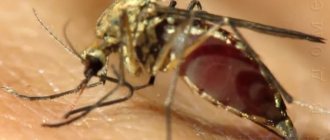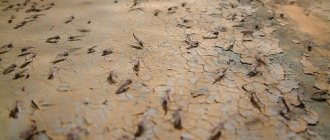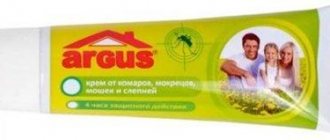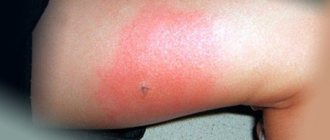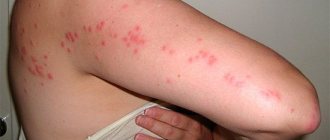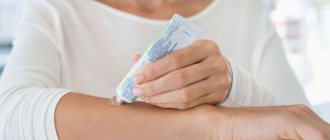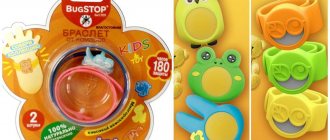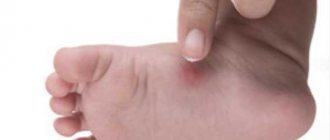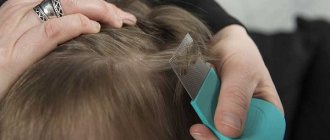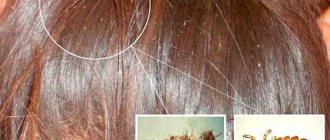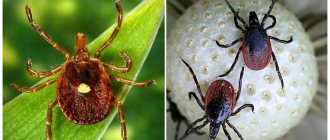Some people consider mosquitoes to be completely harmless creatures that cannot harm humans and only sometimes bite. Such a statement is completely incorrect and a negligent attitude towards the presence of such pests in the house can end very badly. Allergies to mosquito bites are extremely common, and the consequences depend on the individual's tolerance. Sometimes the itching and redness goes away in a couple of days, and in case of complications it is necessary to provide medical assistance and use antihistamines for a long time.
You need to worry about your health if you have previously had an allergic reaction to any other factors. Mosquito bites are not always harmless, but it is better to protect yourself in advance and not tempt fate. It is not difficult to identify the symptoms of an insect attack, but it is worth paying attention to such information to make sure that you are not attacked by other parasites:
- Traces remain exclusively on open areas of the body;
- The lesion is expressed;
- The round area of inflammation is very itchy and even sometimes painful;
- Numerous itchy marks on exposed areas of the body after sleep.
When there are a lot of mosquitoes at home, it is absolutely impossible to rest peacefully at night. Any exposed area of the body will be immediately bitten, since insects rarely sneak under the blanket or bite through clothing. A characteristic sign of a mosquito bite is an area of inflammation around the swelling, which begins to increase many times after scratching. A large number of outbreaks in the morning should worry you. If a person sleeps in the same place for a long time, then allergies to other factors are completely excluded. Thus, mosquito bites on the body are difficult to confuse with other marks.
Clinical picture
An insect bite is often accompanied by swelling and a skin rash; in addition, an allergy to mosquito bites in a child can cause fever, migraine, and, worst of all, angioedema.
It was found that the saliva of a blood-sucking insect contains a large number of allergens that cause irritation to the human body.
With multiple mosquito bites, signs of intoxication were noted. You should not scratch the bites, as this can lead to infection.
According to the type of manifestations, culicidosis can be of several types:
- general reaction . The mark of mosquito bites is no more than ten centimeters in diameter. The swelling quickly goes away without consequences during the day. Treatment consists of the use of antihistamines;
- average reaction Urticaria appears from mosquito bites (see photo above). The person will scratch incessantly and sound short of breath. In this case, you should immediately consult a doctor;
- severe reaction . Anaphylactic shock develops, which can lead to death if rescue measures are not carried out in a timely manner.
Symptoms
Depending on the body’s reaction, there are manifestations that are divided into two groups: local symptoms and general ones. Local symptoms appear in mild form:
- Swelling of the skin at the site of the bite, up to 10-12 cm in diameter, appears instantly and develops gradually over an hour or two, decreasing over 24 hours. For some, several days may pass without appearing as a lump;
- Redness of the papule or change to a pale color;
- Itching, provoking scratching of swellings to wounds;
- The appearance of blisters with watery fluid.
Common symptoms that manifest as more complex reactions and require seeking medical help:
- Swelling spreads not only at the site of the bite, but also to a large part of the body affected by mosquito saliva;
- Deterioration in health, accompanied by shortness of breath, dizziness, lethargy, nausea, indicates that pathological manifestations have spread to the mucous membranes of the respiratory system and internal organs;
- Sometimes body temperature rises;
- Urticaria manifests itself in the form of redness throughout the skin and unbearable itching.
A severe allergy to mosquito vinegar in children is manifested by the following symptoms: vomiting, pain in the abdominal area, attacks of suffocation.
The victim needs urgent hospitalization, because these are only the first symptoms indicating the development of anaphylactic shock. Further, loss of consciousness, sharp pallor of the skin and a decrease in blood pressure are observed. Fortunately, an acute reaction occurs in extremely rare cases.
Causes of allergies
The main cause of allergies is the coagulant poison, which is contained in the saliva of a blood-sucking insect.
The insect injects this poison by puncturing the skin to prevent plasma coagulation.
This is the only way a mosquito can get the volume it needs.
There are two main reasons under the influence of which culicidosis (mosquito allergy) occurs:
- The pathology is inherited. If one of the family members does not tolerate insects well, then the likelihood of an allergic reaction in young children increases many times;
- Sensitization. With this physical condition, the amount of immunoglobulin E in the human body increases, and it is responsible for the occurrence of an allergic reaction. This disease can be caused by an unhealthy lifestyle, as well as poor nutrition, weak immunity, and chronic diseases related to metabolism.
Treatment with traditional methods
The main problem with a common reaction to a mosquito bite is itching, which interferes with proper sleep and leads to numerous scratches appearing on the body.
The intensity of the itching is sometimes such that even an adult cannot ignore the irritation and scratches the skin.
It is more difficult for children to cope with discomfort, so mosquito bites should always be treated with products that reduce itching, and these can not only be pharmaceutical drugs.
In the collection of popular advice there are many ways to help quickly cope with the consequences of bites of blood-sucking insects.
It is recommended to wipe the bite site several times a day:
- A solution of baking soda. Dry soda in the amount of one spoon is diluted in a glass of warm water.
- Decoction of bay leaf. 5-6 laurel leaves are brewed with half a glass of boiling water and, after cooling, used for rubbing.
- Juice from potatoes, onions, citrus fruits, tomatoes. It is good to apply slices of the listed fruits to the inflamed areas.
- Toothpaste containing mint.
- Infusion or decoction of calendula flowers.
- Camphor oil or alcohol.
- Juice of parsley, plantain, mint. The greens of these plants are washed, then kneaded so that the juice is released from it, and in this form is applied for several minutes to a swollen and itchy place on the body.
- Tea tree oil. This ether has antipruritic and disinfectant properties, and therefore prevents infection of the wound.
- Fresh kefir and sour sour cream.
You just need to remember that traditional methods help if the reaction to a mosquito bite is mild.
In case of pronounced changes in the body and in well-being, the use of medications cannot be avoided.
Symptoms of culicidosis
After a mosquito bite, an allergy can appear instantly or within twenty minutes. If sensitization does not occur, then an itchy papule forms in the area of damaged skin (see photo above).
These symptoms last for a short time and then everything is restored.
An allergy to mosquito bites in a child, the symptoms are almost the same as in an adult, here are its most basic signs:
- redness of the skin after a bite, irritation;
- swelling of the bite;
- the formation of urticaria;
- dyspnea;
- nasal congestion;
- pain in the abdominal area;
- weakness, faintness.
Treatment of allergies to mosquito bites
Treatment for culicidosis differs little from therapy for any other allergy. It consists of a set of activities:
- providing first aid after a bite;
- drug relief of local symptoms;
- general antihistamine therapy;
- allergen specific therapy ASIT.
Treatment of allergies to mosquito bites
First aid
Providing first aid for mosquito bites comes down to preventing the formation of large swelling and relieving itching using improvised means.
To provide first aid you can use:
- cold compress, ice pack (in the case of ice, act carefully, wrapping it in a thick layer of cloth);
- soda solution to relieve itching in the form of lotions (approximate proportions, 1 teaspoon of soda per half a glass of water);
- saline solution in the same proportions, for the same purpose;
- any alcohol tincture from a home medicine cabinet will relieve itching (tinctures of calendula, valerian, Corvalol, Valocordin, boric alcohol);
- star balm;
- A child’s bite should be lubricated with brilliant green to prevent the development of an inflammatory process.
Mosquito bites: photos of how they appear
Local drug therapy
A more effective remedy for the symptoms of mosquito bite allergy are special gels, creams and ointments:
- Rescuer;
- Fenistil-gel;
- Akriderm ointment;
- Sinaflan ointment;
- D Panthenol;
- Mometasone;
- Bepanten;
- Soventol;
- Advantan;
- Maskitoll gel;
- Tiger balm;
- Panthenol plus.
Types of blood-sucking mosquitoes
General antihistamine therapy for mosquito bites
Antihistamine therapy is used for moderate to severe allergies to mosquito bites. The need for hospitalization is considered individually, but a doctor must prescribe medications.
Table of drugs for the treatment of allergies to mosquito bites
| A drug | Price | Age limit |
| Loratadine | from 20 rub. | from 3 years old |
| Cetirizine | from 65 rub. | from 6 years old |
| Suprastin | from 125 rub. | from 1 year |
| Erius | from 550 rub. | from 1 year |
| Xizal | from 225 rub. | from 2 years |
| Tavegil | from 180 rub. | from 6 years old |
| Diphenhydramine | from 25 rub. | rectal suppositories for children from one year of age |
Allegard, a product with an individual composition, is also an excellent antihistamine for allergies.
ASIT therapy
Allergen specific therapy (ASIT) for allergies to mosquito bites is carried out by administering drugs with mosquito saliva.
Article on the topic: Diet for allergies in children: menu from an early age
First aid
An allergy to a mosquito bite in a child will go away faster if you follow the following tips:
- thoroughly wash the bite area with cool water and laundry soap;
- it is necessary to refrain from scratching the body;
- All bitten areas of the skin should be treated with an antiseptic.
These measures will be quite enough to prevent the consequences of mosquito bites. But many people simply buy insect repellents and treat their skin with it; this may be a good solution for adults, but not so much for children.
Often children are allergic to mosquito repellent, so this should not be overused.
But if the signs of allergy are pronounced, it is necessary additionally:
- cool the bite with an ice cube;
- lubricate with Fenistil or Soventol ;
- if a tumor appears from mosquito bites, you need to use an ointment of hormonal origin, good ones are Advantan and Hydrocortisone , they cost the same and help effectively;
- a salt compress will also help relieve discomfort; you can use it if you don’t have ointment on hand;
- you need to buy an antihistamine at the pharmacy - Suprastin, Diazolin, Claritin or products with a similar effect.
Causes of allergies to mosquito bites
Allergy to mosquito bites refers to insect allergy (Insecta from Latin insect). Insect allergies include all hyperreactions of the immune system upon contact with insects. The most well-known types of allergies of this type are allergies to bee stings, wasp stings and allergies to aquarium fish food made from dried bloodworms.
Allergy to mosquito bite in an adult
True allergy to mosquito bites occurs infrequently, although it is impossible not to notice it. Blood-sucking insects are divided into stinging and non-stinging. Non-stinging midges “eat away” part of the skin, simultaneously injecting an anesthetic and anti-clotting substance. At first, a person does not feel the midge, but it gets the opportunity to drink blood.
Unlike midges, a mosquito pierces (stings) the skin with its sting and sucks blood like a syringe. In the process, insect saliva enters the human bloodstream, which is toxic to humans. It is this that in most cases becomes the cause of the development of allergies. In addition, a mini-inflammatory process develops at the site of the mosquito bite. It is important not to comb the damaged area, since dirt in severe cases can lead not only to allergies, but also to the development of inflammation in the body, including sepsis.
Allergy to mosquito bites in children
It is believed that an adult can “digest” about 400 mosquito bites without harm to health, without allergies. This is how small a “portion” of saliva enters the blood. The allergy is caused by a substance similar in biochemistry to the enzyme apyrase. The chest and head of a mosquito are also potential allergens.
This is interesting! Only the female mosquito sucks blood. The male part of these insects are vegetarians. They feed on plant pollen. Scientists say that male mosquitoes buzz, and females fly up silently and immediately sting.
A mild allergy at the site of a mosquito bite occurs in everyone. If you don’t scratch the damaged area and don’t provoke more blood flow, then the allergy goes away in 2-3 days. A healthy adult quickly adapts to such insect attacks. A couple of weeks after the start of the mosquito season, the allergy subsides.
Article on the topic: What does a skin allergy look like: photos and types of manifestations
Allergy to mosquito bites: symptoms, photos
A true allergy to mosquito bites occurs in people who have a hereditary tendency to allergic reactions or a history of allergies. Culicidosis is a disease that does not go away with age. Allergies to mosquitoes are more pronounced in children.
Note! Allergies to mosquito bites do not completely go away with age, although the symptoms may become less severe.
Traditional medicine against culicidosis
An allergy to insect bites can go away faster if you use folk remedies:
- Apply a piece of tomato to the injured skin for a few minutes;
- wipe the bite areas with a pre-prepared solution of soda and water (1 teaspoon of powder per 200 ml of boiled water);
- you can lubricate the irritated skin with sour cream, vodka or cologne, after which you will notice how the mosquito bites go away;
- cooling the bite with toothpaste;
- treating injured skin with tincture of chamomile or chamomile.
Disinfection of the wound
Itching occurs at the site of the bite and the tissues around it, and the hand involuntarily reaches out to itch. If an adult can hold on, a child will not stop. The danger of scratching is the possible infection and the beginning of the inflammatory process, so the wound is treated.
Alcohol and substances containing it
The main property of alcohol that helps after insect bites is its ability to denature the protein in mosquito saliva. It eliminates the reason why the immune system responds with itching. In addition to pure medical alcohol, salicylic and boric alcohol have a similar effect.
There is not always alcohol in the house, but there is cologne. It has long been used for disinfection - it contains 60–75% alcohol. Vodka contains less alcohol - about 40%, but it can also have some denaturing effect. Eau de toilette has a similar effect.
You can simply smear it on the wound, but the alcohol will quickly evaporate. It is better to make a swab and apply it to the bite.
The best alcohol solution is calendula tincture. It is not only an antiseptic - the flower extract has anti-inflammatory properties. It is especially recommended for children instead of alcohol and vodka.
Boric acid
The powder is dissolved in warm boiled water - 1 tsp. for 1 glass. Place in the refrigerator to cool, use for compresses after bites. Apply to the sore spot twice a day for 15 minutes. Boric acid does not replace the main treatment, it is used in parallel.
The solution works as long as it remains cold.
Ammonia
They are not used in pure form, but diluted with water in a ratio of 1:3. They wipe the skin with a swab soaked in ammonia, then apply something cold to the bite, preferably ice.
Potassium permanganate solution
The pale pink solution relieves inflammation. They have long been used to wash wounds, lubricate ulcers and burns. An active oxidation process occurs, leading to the death of harmful microbes. A solution of potassium permanganate reliably protects against infection at the site of the bite.
Zelenka and iodine
The solution of brilliant green can be alcoholic (57% ethanol) or aqueous. Both disinfect the skin and dry it. An alcohol solution, which is rare, slightly reduces itching. Iodine is a recognized antiseptic, but has no other properties. You should not smear it on children - it can burn delicate skin.
Furacilin solution
Doctors consider this remedy for mosquito bites to be more effective than iodine and brilliant green. The wound is treated with an aqueous or alcoholic solution of furatsilin immediately after the bite, especially when it is accompanied by pain and burning. Subsequently, apply a wet bandage with furatsilin and hold until it dries.
Pills
Antihistamine tablets remove the consequences of mosquito bites and prevent the unwanted development of the process.
It is not recommended to treat them on your own, except that you can take them once after a bite before visiting a doctor.
Zyrtec
Among antiallergic tablets, Zyrtec has an immediate effect, while most drugs are cumulative. For this reason, it is mandatory for tourists as first aid. The tablets soften allergic manifestations after bites of all insects and even snakes.
Suprastin
An antiallergic drug that prevents, among other things, the negative consequences of the body’s reaction to insect bites. It removes swelling from a mosquito bite and itching. Take with food, wash down with water. Adults are prescribed 1 tablet up to 4 times a day.
Tavegil
Tavegil tablets help even when severe redness, inflammation, and rash appear at the site of the bites. Take a tablet three times a day, after 2 days the swelling, bumps, redness, and itching disappear. Additionally, tampons with soda solution help.
Claritin
The drug comprehensively solves allergic problems. Claritin (Loratadine) is known throughout the world as a safe drug. Prescribed:
- children aged 1–2 years – ¼ tablet;
- 2–12 years – ½ tablet;
- over 12 years old and adults – 1 tablet.
The effect of the drug is fast and, at the same time, long-lasting.
Diazolin
A well-known anti-allergenic agent. Swelling and itching go away quickly.
Possible side effects: dizziness, lethargy. Therefore, it is better to stay at home after taking the pill.
Benadryl
Benadryl (dimetrol) is an antihistamine. Relieves many allergy symptoms, including itching after bites. Typically, adults are prescribed 1-2 tablets every 4-6 hours.
Treatment with medications
If culicidosis occurs, you must see a specialist. In this way, possible complications can be prevented.
Based on the symptoms, the doctor will prescribe local antihistamines. They will relieve redness, swelling and significantly eliminate itching.
For oral use the following is prescribed:
- Claritin;
- Zyrtec;
- Zodak;
- Suprastin (tablets);
- Cetrin.
Along with these medications, hormonal ointments are prescribed for external use:
- Advantan;
- Hydrocortisone;
- Fucidin;
- Gentamicin ointment.
All medications are prescribed by the doctor after diagnosing the patient. If a mosquito bite causes anaphylactic shock, you should call an ambulance.
While waiting for the ambulance to arrive, the victim is laid on a hard surface and his head is turned to one side.
For better blood flow to the legs, the patient must be raised above the rest of the body (Evgeniy Olegovich Komarovsky adheres to these recommendations).
Upon arrival of the ambulance, the specialist gives an injection of Epinephrine. At the same time, antihistamines are administered intramuscularly. In cases of asthma attack, Salbutamol - an anti-asthmatic medicine.
Treatment of the disease
If the manifestations of the inflammatory reaction after mosquito bites on the body do not go away the next day, then we are most likely talking about an allergic reaction - culicidosis.
In this condition, it is advisable to consult a doctor who will prescribe an effective treatment regimen.
It usually consists of the following medications.
Antiseptics for treating the skin at the site of the bite.
Treatment should be carried out 3-4 times a day, this will avoid secondary infection.
Use peroxide, Miramistin, a weak solution of potassium permanganate, Chlorhexidine.
A solution of baking soda not only disinfects, but also reduces itching and swelling.
Antihistamines.
For long-term use, it is better to choose the latest generation of antiallergic drugs; they do not cause drowsiness and do not negatively affect the functioning of the nervous system.
Once a day you can take Loratadine, Cetirizine, Telfast tablets. The general course of treatment can last up to 10 days; if necessary, the doctor will extend it.
Enterosorbents.
Taking medications that improve the removal of toxins from the body is especially necessary when culicidosis manifests itself with general toxic symptoms.
The simplest enterosorbent is activated carbon; Polysorb and Filtrum can be used at any age.
External means.
Use ointments with antiallergic and anti-inflammatory components.
Fenistil gel and Tavegil ointment relieve itching quite well; Psilo-balm, Vitaon, Gistan can be used to treat insect bites in children.
Zvezdochka balm also relieves itching, but it should only be applied if the integrity of the skin is not compromised.
Hormonal ointments such as Sinaflan, Hydrocortisone, Advantan quickly remove swelling and other manifestations of allergies, but since they can cause a number of unwanted reactions, they are used only in exceptional cases and are applied not to the wound itself, but along its edges.
Other ointments are applied to the bite site after preliminary washing and disinfection of the skin; you should not rub the drug in, it will be enough to simply distribute it in a thin layer.
POPULAR WITH READERS: Allergy to a midge bite, what to do, treatment of edema
Non-hormonal ointments can be used up to 4 times a day, hormonal ointments no more than 2 times.
Basic drug treatment can be supplemented with traditional recipes. You should definitely drink more, this will enhance the elimination of toxins.
And it is best not to eat heavy types of food during an allergic reaction, since additional stress on the liver these days is not needed at all.
In the event of a life-threatening allergic reaction - anaphylactic shock or Quincke's edema, emergency medical care should be provided in the first minutes of allergy development.
If possible, the following activities should be carried out:
- If the insect bite is located on a limb, then a tourniquet should be applied above it. You can use improvised means - a belt, a belt from clothes. Applying a tourniquet will prevent further spread of the allergenic poison throughout the body.
- Adrenaline is injected into the swollen tissues. The dose of the drug is selected based on the calculation of 10 mcg per kilogram of weight. But you need to take into account that the total single amount of this medicine should not be 0.3 mg.
- The next procedure is to apply ice or a cold compress to the swelling.
- Intravenous or intramuscular injection of Prednisolone or Dexamethasone. These hormonal drugs inhibit the release of histamine and thus stop the development of an allergic reaction.
The condition of a victim with a severe allergic reaction should be under control until the ambulance arrives.
If the symptoms of the disease do not go away, then hospitalization is necessary for further treatment.
Prevention
There are many preventive measures against mosquitoes. This is extremely important for those whose bodies are prone to allergic reactions.
The following recommendations must be followed:
- place mosquito nets on indoor windows;
- dress only in light-colored clothing that covers the body well;
- do not visit places where mosquitoes like to live: swamps, bodies of water;
- do not walk in the forest immediately after rain;
- do not use tart perfumes;
- to prevent mosquito bites in children, it is necessary to light a fire when outdoors in the evening;
- when going to a forest area, it is recommended to wear thick clothing;
- You should always take antiallergic medications with you.
Mosquito repellents
The choice of mosquito protection depends primarily on the place of its application, as well as the conditions of its use.
- Nets for windows and doors. In summer, when the temperature is high, there is always a desire to ventilate the room. The problem is that mosquitoes will not allow you to enjoy fresh air in peace. To solve this problem, you need to install a special mosquito net on the windows and doors.
- Magnetic curtains. This type of protection appeared relatively long ago. Insect curtains are a mesh with a magnetic lock in the middle.
- Ultrasonic repeller. A new product in the field of protection against mosquitoes and other insects. This device makes a special sound that repels insects, but humans cannot hear it.
- Fumigator. This is a special electrical device designed to disinfest a room from insects. The fumigator uses a special liquid, plate or tablets. The device heats up with electricity and releases a substance that is lethal to mosquitoes into the air, but is safe for humans.
- There are also spirals on sale that also operate on the principle of fumigation, but unlike the previous option, no electricity is required. The spiral needs to be set on fire, and as soon as it catches fire, immediately extinguish it. Smoke will gradually begin to rise from the spiral, poisoning the insects.
- Mosquito sprays. This remedy is indeed very effective, but many people do not know that hives can form from the spray. Therefore, before using this insect repellent, you must study the instructions.
- Bracelets. Another new product in the fight against annoying insects. Bracelets are made mainly from food-grade silicone impregnated with a special agent that protects its owner from insects.
How does culicidosis manifest?
During a normal human reaction in the event of a bite, a small papule appears (usually no more than two centimeters). The papule may cause mild discomfort due to itching (a local inflammatory reaction begins).
If such a swelling transforms into a large red spot, which causes severe itching and rises above the general skin, we can talk about a local allergic reaction (the severity level of such a reaction is quite mild).
When the entire body is involved in the pathological process, we can also talk about a mild stage of culicidosis. In this case, the following phenomena are possible:
- redness is observed throughout the body;
- you can see numerous rashes;
- the itching becomes unbearable, the child may be capricious and refuse to eat due to discomfort.
In this case, it is enough to apply, for example, Fenistil emulsion or an alcohol-containing product to the skin (Calendula tincture is often recommended)
Pathology of moderate severity develops if there is a disruption in the functioning of internal organs. With such an allergic reaction, the following phenomena are observed:
- respiratory disorders, shortness of breath;
- painful sensations in the abdomen;
- dizziness, nausea and weakness.
If nausea provokes vomiting, and shortness of breath causes suffocation, we can talk about a severe stage of culicidosis. With such a pathology, it is necessary to seek qualified medical help as soon as possible.
Another dangerous symptom of an allergic reaction is rapid swelling of the face, especially the lip and eye areas. The danger of this pathology is that with it a person can die in just a few minutes. Quincke's edema can affect, for example, only the eyes or face, or it can block the airways. Anaphylactic shock is characterized by a sudden loss of consciousness and suffocation, while cardiac activity almost completely stops.
It is worth noting that a mosquito bite can rarely cause a reaction of this severity in a baby, but parents should still be aware of this danger.
What to do if the consequences could not be avoided
Treatment for a severe allergic reaction should be under medical supervision. To treat acute type of laryngeal stenosis and normalize blood pressure, inhalation of glucocorticosteroids through a nebulizer is used.
The maximum number of inhalations is 3 times with an interval of thirty minutes , otherwise a rash similar to bites may appear. But this will already be an overdose of the drug.
Allergy tablets - Suprastin are used when inhalation therapy is ineffective. To relieve an attack of suffocation, it is recommended to use Berodual through an inhaler. If a reaction to mosquito bites occurs, the victim must be quickly taken to the hospital.
Complications of allergies in children
The greatest danger in a child with allergies is represented by multiple bites, localized compactly. Such damage causes persistent local swelling, which can last for more than a month, and an increase in body temperature.
There are cases where an allergic reaction to mosquitoes led to the development of immunoinflammatory kidney disease - glomerulonephritis. This is a severe chronic lesion of the glomerular apparatus, the outcome of which is renal failure.
Signs and symptoms of mosquito bite allergy
The second type of complicated allergy to mosquito bites is a local or general inflammatory process. It develops initially from the fact that an infection was introduced into the wound by the insect itself. The bitten area begins not only to hurt and itch, but also to fester. With multiple injuries, the inflammatory process can become total.
Symptoms of general inflammation with an allergy to mosquito bites are pain and enlargement in the inguinal lymph nodes. Even dried “old” sores from scratching begin to fester throughout the child’s body. If the process is started, sepsis is likely.
Diet
In order for the rash from bites to go away as soon as possible, you need to go on a diet, here is a list of foods that need to be excluded from your diet if a person has been allergic since birth:
- honey;
- seafood;
- confectionery;
- nuts, smoked meats;
- mushrooms;
- cow's milk;
- red vegetables and fruits;
- seasonings and spices.
You need to consume the following foods daily:
- porridge with water;
- lean meat;
- dairy products;
- green fruits and vegetables;
- tea, compote
In conclusion, we emphasize that it is necessary that parents do not try to determine on their own what kind of rash the baby has.
In order not to waste precious time, you must immediately call a doctor. And the most important thing is that you should not smear this rash with iodine or brilliant green, since no specialist will ultimately be able to determine what broke out on the child’s skin.
Home remedies for allergies
Affordable home remedies for mosquito allergies will help relieve unpleasant skin symptoms. Let's look at the simplest and fastest helpers:
- Water. Both ice and hot water will help relieve itchy skin. After the bites, you can try taking a relaxing bath by adding strong tea leaves, 2 mugs of dry oatmeal and 2 tablespoons of apple cider vinegar to the water. And if you are near the sea, just plunge into its waves.
- Spoon. Try heating a metal spoon in hot water and then placing it on the bite area. It is important to keep the spoon pressed firmly against the bite for several minutes.
- Honey. If you're not allergic to this sticky sweetness, try applying honey to a mosquito bite. The product will help quickly relieve itching and inflammation.
- Milk and water. Mix water and milk in equal parts, and then wet a napkin or handkerchief with the mixture and blot the bitten area with it.
- Kefir and sour cream. Try applying fermented milk product to the bite. These products will help quickly soothe your skin.
- Soda. Apply a solution of soda (1-2 teaspoons per glass of water) to gauze and apply to the bite site and lubricate the affected areas.
- Lemon or lime juice. Citrus fruits have antibacterial properties. However, if you decide to lubricate your bite with citrus juice, stay home. The sun can cause severe burns to the skin.
- Ice. Apply an ice pack or ice cubes to the bite. and hold them for 20 minutes. Cold will reduce the natural release of histamines in the body.
- Tea bags. Cooled tea bags will relieve itching and reduce swelling after a bite. The tannin contained in tea has astringent properties. The tea will remove all excess fluid and soothe the skin.
- Vinegar. This simple home remedy will help relieve the itching after a bite due to its slight level of acidity. A weak vinegar solution (9% vinegar) should be diluted with water in a ratio of 1:3 and wipe the bite areas with it. A thick paste of flour and apple cider vinegar will also help soothe the skin. It must be carefully applied to the damaged area of the skin, allowed to dry, and then rinsed with water. The itching from the bite will go away as the rash subsides.
